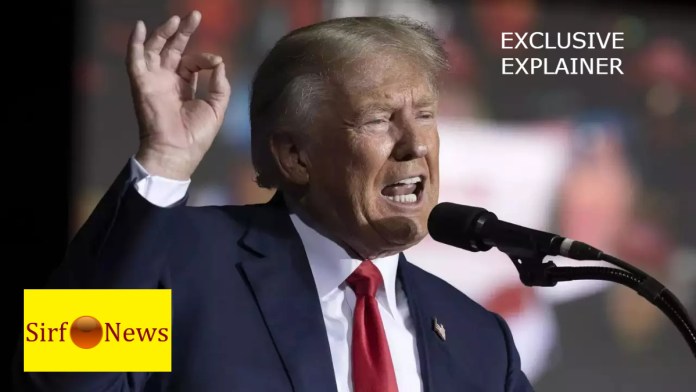Former US president Donald Trump has called for the termination of the Constitution of the United States, terming the 2020 election a “massive fraud”, weeks after announcing his bid for the 2024 election in a social media post. Meanwhile, Democrats have retained control of the Senate as many Trump-backed Republican candidates lost in the races for both Senate and House of Representatives, fuelling more election denialism.
As explained recently in a detailed explainer on Sirf News, there are parts of the US governance structure that cannot affect Trump while there are others that Trump cannot affect. But his statement assumes significance as it comes after the release of internal Twitter emails showing deliberation in 2020 over a New York Post story about material found on Hunter Biden’s laptop.
“Do you throw the Presidential Election Results of 2020 OUT and declare the RIGHTFUL WINNER, or do you have a NEW ELECTION? A Massive Fraud of this type and magnitude allows for the termination of all rules, regulations, and articles, even those found in the Constitution,” Trump wrote in a post on the social network Truth Social and accused “Big Tech” of working closely with Democrats. “Our great ‘Founders’ did not want, and would not condone False & Fraudulent Elections!”
How would a revised or new constitution of the US help Trump?
Recall that, while he was the POTUS, Trump had brought in five virtual or informal amendments to the American constitution. And he was not the first US president to do so. George Washington had set enduring precedents such as the two-term limit on presidential service (a norm so embedded that after Franklin D Roosevelt broke it, it was written into the formal constitution). Andrew Jackson reimagined the president as the direct representative of the people. Abraham Lincoln ruled out secession.
Interestingly, the US constitution can be informally amended! In 1803, for example, the Supreme Court of the US granted itself the power to review laws and overturn them. In 1824, the states tied the electoral vote to the popular vote. Neither of those changes was inscribed on parchment or envisioned by the founders of the United States, but today the system cannot be visualised without them.
So, what did Trump amend informally? One: No president shall be removed from office for treason, bribery, or any other crime or misdemeanour, no matter how high, should a partisan minority of the senate choose to protect him.
Two: Congressional oversight shall be optional. No congressional subpoena or demand for testimony or documents shall bind a president who chooses to ignore it.
Three: Congressional appropriations shall be suggestions. The president may choose whether or not to comply with congressional spending laws, and Congress shall have no recourse should a president declare that his own priorities supersede Congress’s instructions.
Four: The president shall have the authority to make appointments as he sees fit, without the advice and consent of the Senate, provided he deems his appointees to be acting, temporary, or otherwise exempt from the ordinary confirmation process.
Five: The president shall have unconstrained authority to dangle and issue pardons for the purpose of obstructing justice, tampering with witnesses, and forestalling investigations.
Perhaps what Trump had in mind yesterday while asking for the scrapping of the constitution was turning the informal amendments formal. If done — looks possible only hypothetically — this will end all cases and investigations into his tenure as president as well as his deeds immediately following his resignation, for example taking office files home.
Even Republicans are either critical of — or silent on — Trump
“This is what kills my party right now,” said former New Jersey governor Chris Christie, a Republican who is considering a 2024 presidential campaign against Trump and spoke on ABC’s “This Week.”
Mike Lawler, an incoming House Republican from New York, told CNN’s “State of the Union” that “obviously, I don’t support” Trump’s demands, and that the Constitution exists “to protect the rights of every American.” Lawler and others suggested that Trump needs to get past his 2020 election loss to President Joe Biden: “I think the former president would be well-advised to focus on the future if he is going to run for president again.”
Higher-ranking Republicans remained silent, while Democrats and others condemned what some described as a call for dictatorship.
White House condemns Trump’s statement
The White House admonished Trump’s statement saying, “attacking the Constitution and all it stands for is anathema to the soul of our nation and should be universally condemned.” “You cannot only love America when you win,” spokesperson Andrew Bates said in a statement, calling the constitution a “sacrosanct document”.
“You cannot only love America when you win,” Bates said in a statement. “The American constitution is a sacrosanct document that for over 200 years has guaranteed that freedom and the rule of law prevail in our great country. The constitution brings the American people together – regardless of party – and elected leaders swear to uphold it. It’s the ultimate monument to all of the Americans who have given their lives to defeat self-serving despots that abused their power and trampled on fundamental rights.”
Trump lost to Biden in 2020 by more than seven million votes and by 306-232 in the electoral college, but continues to claim that Biden won key states through electoral fraud, an allegation that fuelled the deadly attack on the US Capitol on 6 January 2021.
Republican Liz Cheney of Wyoming, who serves as vice chair of the House select committee investigating the attack on the US Capitol, tweeted that no honest person can now deny that Trump is an enemy of the Constitution.




You must log in to post a comment.